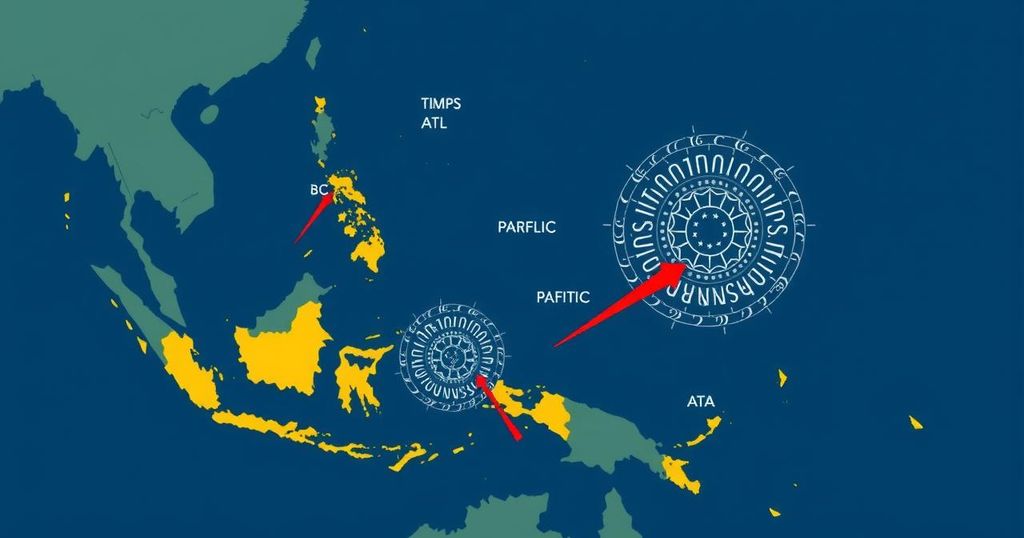Heritage Foundation Calls for Continued U.S. Engagement in Pacific Islands to Counter China

The Heritage Foundation’s report advocates for sustained U.S. engagement with Pacific Island nations, emphasizing its strategic importance in countering Chinese influence. It highlights bipartisan support for various policy recommendations while acknowledging the islands’ broader challenges beyond U.S.-China competition.
The Heritage Foundation, a conservative think tank, has recently released a report emphasizing the necessity for continued U.S. engagement with Pacific Island nations, irrespective of the political party that succeeds in the upcoming presidential election. This region, located strategically between Hawaii and Australia, has emerged as a significant battleground for influence between the United States and China. In his 45-page analysis, Andrew Harding, a research assistant within the think tank’s Asian Studies Center, argues that it is imperative to convince both taxpayers and policymakers in Washington that investments in the Pacific Islands are a prudent allocation of resources. Such investments are posited as essential for thwarting Chinese ambitions, thereby preventing Beijing from establishing a foothold that might jeopardize U.S. national security and complicate future military operations in Asia. This perspective resonates with certain factions within the Republican Party, especially among China hawks. Alexander Velez-Green, who previously served as national security adviser to Senator Josh Hawley, described the report as “a compelling vision,” stating that the Pacific Islands represent critical terrain in America’s strategy to counterbalance China’s influence. Former adviser Alexander Gray from the Trump administration concurred, indicating that the recommendations in the Heritage Foundation report would be advantageous for whichever candidate occupies the presidency in January 2025. He predicted that a potential second Trump administration would likely expand upon the initiatives proposed in the report. Notably, the Heritage Foundation has substantial ties to former Trump administration officials. Last year, it introduced Project 2025, which outlines plans for staffing and policy formulation for a prospective subsequent Trump presidency. Former President Trump has distanced himself from this initiative, even as Vice President Kamala Harris suggests it encapsulates his political ideology. Critics of Harding’s report, such as John Hennessey-Niland, a former U.S. ambassador to Palau, argue that while the concern over Chinese interference is legitimate, it overlooks other significant issues faced by the Pacific Islands, such as climate change and their own developmental challenges. Kathryn Paik, who previously directed Pacific and Southeast Asia initiatives under President Joe Biden, echoed this sentiment, asserting that focusing U.S. engagement solely on competition with China diminishes the potential to deepen ties rooted in shared history, culture, and values. Harding articulated the foundation’s stance by suggesting that the primary impetus for America’s involvement in the region is indeed the prevalent U.S.-China competition and the resultant threats to American national interests. The contrast in diplomatic engagement between the U.S. and China is stark, with Chinese President Xi Jinping actively engaging with leaders from Pacific Island nations, while the Biden administration has yet to make a significant independent diplomatic effort to visit the region. Despite differing opinions on the rationale for increased U.S. engagement, many policy recommendations in the report enjoy bipartisan support. These include appointing a special envoy for the Pacific Islands, enhancing staffing within key governmental departments for oversight, and planning presidential visits to Pacific nations. According to Greg Brown from the Australian Strategic Policy Institute, the appointment of a prominent special envoy is crucial for sustained U.S. engagement and will require significant persuasive efforts to educate Congress on the importance of allocating foreign assistance to this strategically vital region. Brown stressed the necessity for such an envoy to hold significant influence within the White House and possess the diplomatic acumen to foster meaningful changes in Washington’s approach to the Pacific Islands.
The rising strategic competition between the United States and China has escalated the importance of Pacific Island nations in geopolitical discourse. As China increases its influence through direct diplomatic engagements and economic investments in these nations, experts highlight the urgent need for the U.S. to bolster its presence and secure its interests in the region. The ongoing discussions among policymakers, think tanks, and analysts reflect diverse opinions on how to effectively balance these competing interests while addressing the multifaceted challenges faced by the Pacific Islands.
In conclusion, the Heritage Foundation’s report underscores the critical need for the United States to maintain and amplify its engagement with Pacific Island nations, irrespective of future presidential outcomes. It advocates for establishing a foothold that counters Chinese influence while recognizing the region’s intrinsic challenges beyond just geopolitical competition. As bipartisan support for some recommendations emerges, the successful implementation of these strategies will depend heavily on Congressional buy-in, continued diplomatic engagement, and a comprehensive understanding of the Pacific Islands’ diverse needs.
Original Source: www.voanews.com






